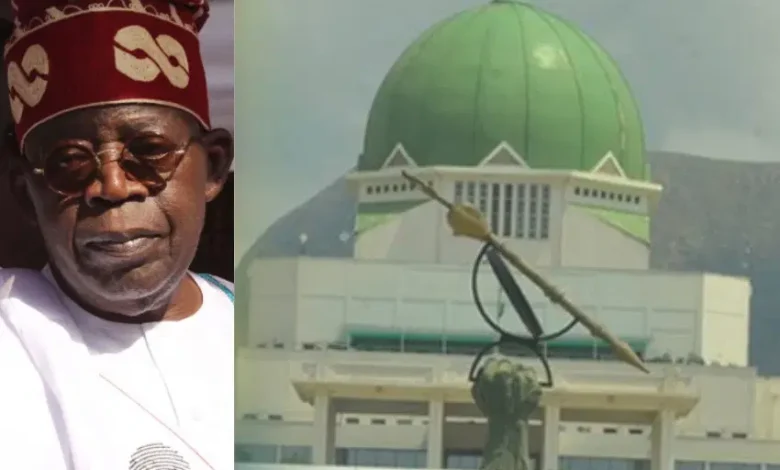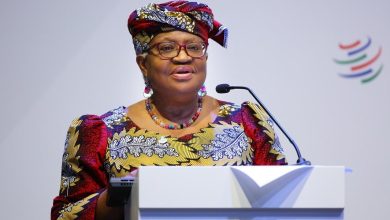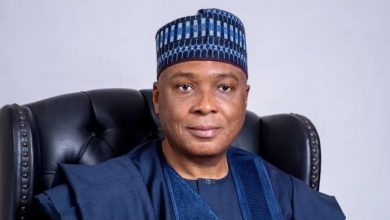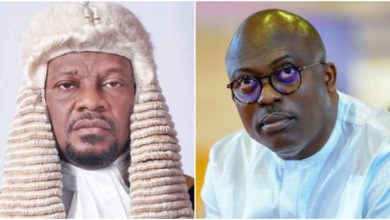NASS Hails President Tinubu’s Efforts on Democracy Day

As the nation celebrated Democracy Day on June 12, the National Assembly lavished President Bola Tinubu with praise.
In his welcome speech to Tinubu at a joint session of the Senate and the House of Representatives on Thursday, Senate President Godswill Akpabio hailed the president as one of the founders of Nigerian democracy.
The National Assembly is honored to have you as our President, a fellow citizen, and one of our own, as you carry out the grave constitutional obligation of speaking to the country. This chamber honors you as one of the founders of the very democratic framework we celebrate today, not only as President.
Today, instead of lamenting injustice, we have gathered to celebrate resiliency. Instead, we witness the Nigerian people’s unwavering faith in democracy, which has withstood betrayal, weathered tear gas, challenged armored tanks, endured quiet, and still favored voting over using a gun, Akpabio stated.
Taking a trip down memory lane, Akpabio praised Nigerians for their fortitude in defending democracy against violence.
“The torch of the long march to freedom was lit on June 12, 1993. Standing up, Nigerians declared, “Our voice matters.” “Our vote matters.”
The flame was extinguished on June 12, 1993, however, according to Akpabio, when a brief statement proclaimed that the Nigerian people’s freely expressed decision in the historic June 12 Presidential Election had been revoked.
The streets were filled with tears, anger, and hope. Not only did Nigeria lose an election, but she also lost her innocence. And all around the nation, the roar of resistance broke the shock-induced hush. They got up. Students marched out of rage.
The first line of Chief Moshood Abiola’s campaign song, “Nigeria on the march again,” perfectly encapsulated the mood of the day. In fact, Nigeria was moving closer to democracy. However, that harsh declaration transformed the democratic march into a march for justice,” he continued.
Read Also: Al Mustapha: Abacha Didn’t Loot, He Saved the Money for Nigeria
Tinubu was among the many who stood tall during those hard days, he said, adding that “when some chose silence or compromise, the President “chose courage.”
“You were a part of NADECO, which at great personal cost helped keep the flame of liberty burning when it was most in danger of going out,” he remarked. In light of this, let us commemorate those who suffered so that we could cast our ballots. People who took chances so we may talk. Those buried in order for freedom to emerge. In addition, we should honor everyone who was instrumental in Nigeria’s democratic shift.
The topic for this year, “26 Years of Democracy: Renewing Our Commitment to National Development,” is not a catchphrase. It’s a call to action. A reminder that democracy is a tool for national development rather than its goal.
Under Tinubu’s leadership, Nigeria has seen previously unheard-of progress, according to the Senate President.
President Tinubu’s audacious approach to challenging reforms has changed under his direction. This administration has not hesitated to make the difficult choices necessary to stabilize and expand our economy, he said, from creating regional development commissions to the Nigerian Education Loan Fund to unifying the foreign exchange market, granting local governments autonomy, eliminating fuel subsidies, luring foreign investment, and enacting tax reforms.
2 Years Later, 844 Bills Were Introduced
In addition, Akpabio enumerated some of the NASS’s accomplishments prior to its June 13 second anniversary.
He stated, “This dedication is demonstrated by its remarkable output: in its first two years, 844 measures have been introduced, an unparalleled number that highlights the Senate’s proactive approach to addressing urgent national challenges.
206 bills are awaiting first reading, indicating a strong pipeline of legislative ideas ready for formal introduction, 409 bills have advanced to second reading, and 107 bills are currently in the committee stage, undergoing the necessary scrutiny and stakeholder engagement that ensures quality legislation.
He revealed that, at this point in the legislative cycle, the Senate had passed 96 measures, which is “a record for any Nigerian Senate.”
More importantly, 52 of these bills have received the president’s signature, becoming enforceable laws that will influence national security, public welfare, economic growth, and governance.
These legislation cover a variety of topics, such as tax changes, regional development commissions, universities and tertiary institutions, agricultural institutions, the National Education Fund, and local government autonomy.
Furthermore, in its interactions with the executive branch, the 10th Senate has demonstrated a sound balance between oversight and collaboration by taking decisive action on 26 Executive Bills. The Senate thoroughly reviews and refines these executive-sponsored laws before they are passed, and they target important subject topics.
Eighty petitions were received.
Akpabio added that 18 of the 80 petitions that the 10th Senate received from citizens and civil society had been fully embraced.
In addition to laws, the 10th Senate has received 80 petitions from civil society and citizens. This demonstrates how much the public trusts the organization. 18 of these petitions, which offer redress, transparency, and institutional responsibility, have been fully adopted.
According to history, countries advance most when the legislature provides wise guidance and the executive leads with vision. However, he stated that they thrive best when they work together as co-stewards of the national trust rather than as competitors.
He thus asked Nigerians to uphold the June 12 lessons.





